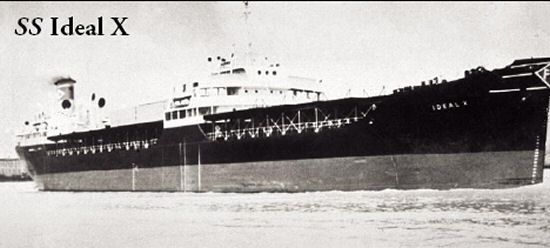Malcolm P. McLean
1914-2001
Inventor of the Box That Changed the World
by Dr. Tom Hanchett*
Reprinted with permission from the Tar Heel Junior Historian. Fall 2006.
Tar Heel Junior Historian Association, NC Museum of History
The idea to move goods in big metal boxes was a simple idea, but a powerful one. Make each box as large as a truck-trailer. Put the box on truck wheels and pull it over the highway. Put it on train wheels and pull it over the railroad. Build a huge crane to stack it onboard a boat. Goods would move quickly and surely, because they got packed in the box at the start of the trip and unpacked at the end. In between, no one would touch them.
 Malcom P. McLean, of North Carolina, turned that simple idea into an important reality half a century ago. His invention—containerized shipping—changed the world. McLean was born in 1914 in Robeson County. From humble roots, he built a major business empire.
Malcom P. McLean, of North Carolina, turned that simple idea into an important reality half a century ago. His invention—containerized shipping—changed the world. McLean was born in 1914 in Robeson County. From humble roots, he built a major business empire.
Young Malcom McLean began driving a truck at age seventeen during the hard times of the Great Depression. By the 1950s, he owned one of America’s biggest transportation companies, based in Winston-Salem. On highways throughout the eastern United States, everyone knew the tractor-trailer rigs with the big, red McLean Trucking Company diamond.
McLean had gotten the shipping container idea back in 1937, when he was still driving his own truck. He had sat for a whole day at a New Jersey port waiting for workers to unload his truck and put the goods on a ship. Why not make a truck-trailer that could be lifted onto a ship or onto railroad wheels—without anyone touching the contents?
At age forty-two, wealthy from his trucking business, McLean could at last pursue his dream. He bought an old oil tanker, a large ship, the Ideal-X. His workers modified fifty-eight truck-trailers, making each trailer-box separate from its chassis and wheels. On April 26, 1956, at the port of Newark, New Jersey, McLean watched proudly as a giant crane swung the trailer-boxes up onto the Ideal-X. The ship steamed off toward Houston, Texas. The era of container shipping had begun.
By the mid-1960s, McLean’s SeaLand company had built container-handling facilities in many U.S. p orts. Going overseas was the next logical step, but the expense was too great for SeaLand.
orts. Going overseas was the next logical step, but the expense was too great for SeaLand.
The Vietnam War was raging, and McLean saw a way he could help the government and help his company. He convinced officials at the Pentagon to build a container-handling facility near Saigon, Vietnam. Just two of McLean’s highly efficient container ships could carry as much military freight as four regular boats. With the Pentagon paying SeaLand ships to travel to Asia, it was easy to stop off in Japan and bring inexpensive manufactured goods back to the United States.
That marked a turning point in the rise of today’s globalized economy. Suddenly, it became very easy for American stores to buy from factories where labor was cheap— anyplace in the world.
Since the 1960s, the globalized economy has brought great changes across North Carolina. On one hand, for example, textile factories throughout the state have closed, unable to match the prices of imports. On the other hand, Wilmington has become a thriving port for container ships. SeaLand is now part of Danish-owned Maersk corporation, which has a huge office building in Charlotte. Charlotte also is the headquarters for a SeaLand spin-off called Horizon Lines, one of America’s largest shipowners.
McLean died in 2001.
*At the time of this article’s publication, Dr. Tom Hanchett was staff historian at the Levine Museum of the New South in Charlotte.
References and additional resources:
Greh, Thomas. The Container Story. Trifilm GmbH, 2006.
Poston, Toby. "Thinking Inside the Box." BBC News. April 25, 2006. <http://news.bbc.co.uk/2/hi/business/4943382.stm>.
Levinson, Marc. 2006. The Box: How the Shipping Container Made the World Smaller and the World Economy
Bigger. Princeton, N.J.: Princeton University Press.
Resources in libraries via WorldCat
1 January 2006 | Hanchett, Tom